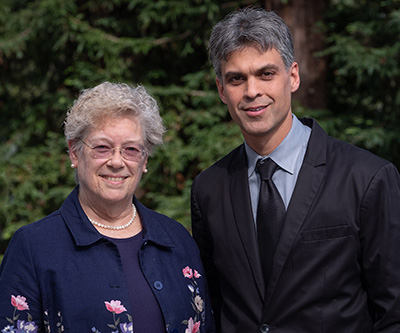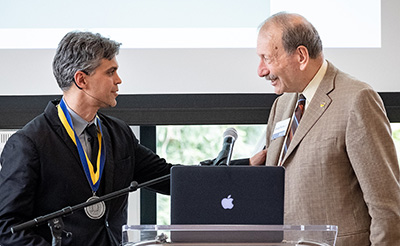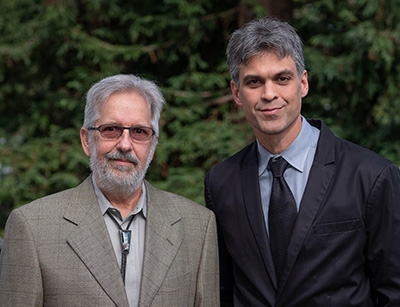Campus News
Astronomer Enrico Ramirez-Ruiz appointed to endowed chair for diversity in astronomy
The May 22 investiture ceremony honored Ramirez-Ruiz as the inaugural holder of the Vera Rubin Presidential Chair for Diversity in Astronomy.





Enrico Ramirez-Ruiz, professor and chair of astronomy and astrophysics at UC Santa Cruz, was honored as the inaugural holder of the Vera Rubin Presidential Chair for Diversity in Astronomy at an investiture ceremony on Wednesday, May 22, at the University Center.
The chair was created in 2018 to advance the cause of diversity, equity, and inclusive excellence in astronomy. It is named for the distinguished astronomer Vera Rubin (1928-2016), who was a champion of inclusivity in science and a beloved mentor for younger women and for dozens of astronomers from varied backgrounds.
Sandra Faber, a professor emeritus of astronomy and astrophysics who helped establish the chair, said Rubin was an important mentor for her. “She was an incredible role model, and it was a terrific learning experience for me to see how she did science,” Faber said.
Vera Rubin’s son David, a researcher in Earth and Planetary Sciences at UC Santa Cruz, also spoke at the investiture. “Our family is very happy that there is a chair named after our mom, and I couldn’t imagine a better place for it than UC Santa Cruz,” he said.
Faber noted that the Rubin Chair is different from most endowed chairs in the way its funds are intended to be used. “The point is that the person in the chair uses the funds for the good of diversity in the department,” she said.
Ramirez-Ruiz has worked vigorously to support the promotion and retention of women and people from under-represented groups in astronomy and related fields. He established and directs the Lamat program, which gives undergraduate students the opportunity to work with UC Santa Cruz faculty and graduate students on computational astrophysics projects. The Lamat program has helped double the number of Latinos enrolling in the country’s top astronomy graduate programs, he said.
With the funds from the Rubin Chair, Ramirez-Ruiz said he will continue working to support students at all levels and give them opportunities to develop as scientists and leaders. He is working to broaden the Lamat program to give it a greater emphasis on developing students’ data science skills, and he wants to build on the Osterbrock Leadership Program for astronomy graduate students to empower more graduate students to take on leadership roles.
“Our department has made impressive progress in promoting diversity at both the undergraduate and graduate levels,” he said. “Starting next fall, 50 percent of our graduate students will be from under-represented groups. I’m confident we have a great group of people, and now we need to support them.”
Excellence and diversity intertwined
Increased diversity creates opportunities to learn from a wide range of perspectives, Ramirez-Ruiz said, adding that working with diverse students has made him a better scientist. “Excellence and diversity are intertwined,” he said. “My most creative work has been done with students. Intellectual diversity leads to creative solutions to problems.”
Ramirez-Ruiz said his department has more National Science Foundation graduate fellowship recipients than any other astronomy department in the country, and the third largest number of prize postdoctoral fellowships awarded to its students in the past decade, while at the same time earning recognition from the American Astronomical Society with the highest diversity ranking score in the country.
Noting that he would like to see more people of color in faculty and leadership positions, Ramirez-Ruiz said he is proud of the work the astronomy department has done to address the “pipeline issue” by recruiting talented students from under-represented groups. But there is significantly more work to be done, he said.
“We want our students to be as prepared as possible, so wherever they go they will feel empowered,” he said. “I love to see alumni from our department populating the field as faculty members, and I know that as they advance in their careers they will be invested in mentoring others.”
Ramirez-Ruiz is a theoretical astrophysicist whose research explores the violent and capricious nature of the universe. He uses computer simulations to study transient phenomena such as collisions, mergers, and disruptions of stars, and his work is essential to interpreting the results of gravitational wave detections. Since joining the UC Santa Cruz faculty in 2007, he has earned numerous awards and honors, including a Packard Fellowship, a Niels Bohr Professorship, and most recently the 2019 HEAD Mid-Career Prize from the American Astronomical Society.
The Rubin Chair endowment fund received major contributions from several donors, including Sandra and Andrew Faber, John and Barbara Crary, and the Heising-Simons Foundation, as well as matching funds from the UC Office of the President.